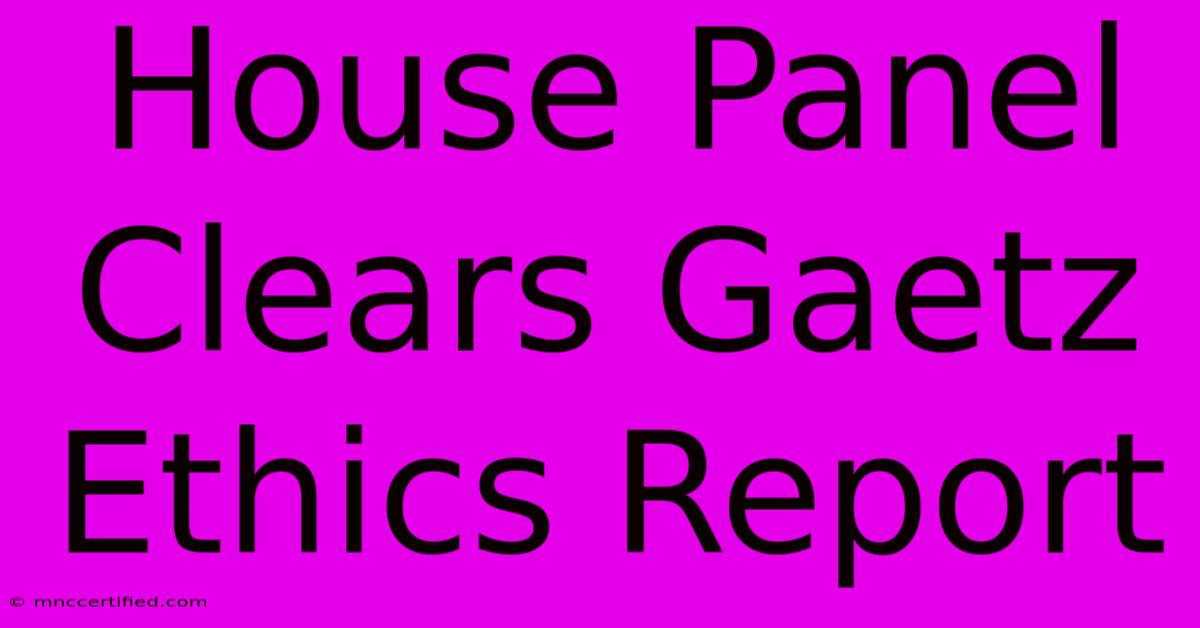House Panel Clears Gaetz Ethics Report

Table of Contents
House Panel Clears Gaetz Ethics Report: What it Means and What's Next
The House Ethics Committee has concluded its investigation into Representative Matt Gaetz, clearing him of alleged ethics violations. This decision, while seemingly bringing closure to a long-running saga, leaves many questions unanswered and sparks considerable debate about the process and its implications. This article will delve into the details of the report, its findings, the criticisms leveled against it, and the potential future ramifications.
Key Findings of the House Ethics Committee Report
The House Ethics Committee, after a comprehensive (or so it claims) investigation, concluded that Representative Gaetz did not violate House rules. The report, while not publicly released in its entirety, reportedly addressed allegations of sexual misconduct, campaign finance irregularities, and potential conflicts of interest. The committee's finding of "no violation" suggests they found insufficient evidence to support the claims against the Florida Republican. This does not, however, equate to a declaration of innocence. The difference is crucial and often overlooked in public discourse.
Criticisms and Concerns Regarding the Report
The lack of transparency surrounding the report immediately fueled criticism. Many argue that the absence of a fully public report hinders proper scrutiny and raises concerns about a potential whitewash. The committee's decision-making process itself has also been called into question, with critics pointing to potential political bias influencing the outcome. The perceived lack of thoroughness in the investigation further exacerbates these concerns. Specifically, the committee's handling of witness testimonies and evidence remains a point of contention.
Allegations Against Representative Gaetz
The initial allegations against Representative Gaetz were serious and multifaceted. They included accusations of sexual relationships with underage girls, potential misuse of campaign funds, and potential violations of federal lobbying laws. The gravity of these allegations initially led to calls for a thorough and transparent investigation. The committee's conclusion, however, has fallen short of satisfying many who believed a more rigorous process was warranted given the nature of the accusations.
Political Implications and Future Ramifications
The House Ethics Committee's decision has significant political ramifications. While it may provide some relief to Representative Gaetz, the lingering questions and criticisms are likely to continue to follow him. His standing within the Republican party remains a subject of speculation, while his future political aspirations remain uncertain in the face of public distrust and ongoing debate. The fallout extends beyond Gaetz himself, potentially impacting public trust in the integrity of congressional investigations.
Impact on Public Trust in Congress
This case highlights the ongoing debate about transparency and accountability in Congress. Many observers believe this outcome reinforces public cynicism towards government institutions. The perception of a flawed process, even if unintentionally so, undermines faith in the ability of Congress to effectively investigate and address misconduct by its own members. Restoring public trust will require demonstrably transparent and rigorous ethical investigations in the future.
Conclusion: Moving Forward
The House Ethics Committee's decision to clear Representative Gaetz of ethics violations is not the end of the story. The controversies surrounding the investigation, the lack of transparency, and the persistence of public skepticism create an ongoing narrative. This outcome underscores the vital need for greater accountability and transparency within congressional ethics investigations to rebuild public trust and ensure the integrity of the legislative process. The debate is far from over, and its consequences will likely be felt for some time to come. Further investigations by other bodies might be initiated, shaping the narrative for years to come.

Thank you for visiting our website wich cover about House Panel Clears Gaetz Ethics Report. We hope the information provided has been useful to you. Feel free to contact us if you have any questions or need further assistance. See you next time and dont miss to bookmark.
Featured Posts
-
Walker For Bahamas Ambassador Trumps Choice
Dec 19, 2024
-
Fed Meeting Rates Cut By 0 25
Dec 19, 2024
-
Fatal Descent Eyewitnesses Describe Crash
Dec 19, 2024
-
Stock Market Dips Fed Hints At Rate Slowdown
Dec 19, 2024
-
New Christmas Special Arnolds Santa Role
Dec 19, 2024